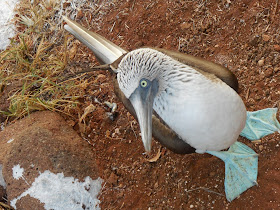Wondering what islands to pick for your precious Galapagos time?
I've been there and can help! Grab a free 20-minute get-acquainted session by CLICKING HERE!
If you love birds, check out the island of North Seymour!
On the rocky island just north of Baltra (where the main airport is located) you can hike down a trail, literally surrounded by mating, nesting, and parenting birds of the Galapagos.

 The frigate birds nest on bare tree limbs, their babies born about 4" high and pure white!
The frigate birds nest on bare tree limbs, their babies born about 4" high and pure white! This is one bird of the Galapagos that'll parent their babies for almost 3 years (the longest parental care period of any bird, anywhere, actually!) during which the juveniles will molt from white to tan, gray to eventually black at adulthood.
 The adult male frigate birds of the Galapagos have small pouches which dangle at their chins, and they inflate these ruby-red sacks to giant 2' balloons to attract the females. The red balloons, strikingly decorated with black dots, combine with a loud flapping ritual for mating, and when many of these frigates get excited at the same time, it can be a cacophony of honks and bats and energy. Here's what one guy looks like (to the left).
The adult male frigate birds of the Galapagos have small pouches which dangle at their chins, and they inflate these ruby-red sacks to giant 2' balloons to attract the females. The red balloons, strikingly decorated with black dots, combine with a loud flapping ritual for mating, and when many of these frigates get excited at the same time, it can be a cacophony of honks and bats and energy. Here's what one guy looks like (to the left).My favorite bird of the Galapagos? The blue-footed boobies!
They do their dance, hopping one aqua webbed foot to the other.
Then, in less time than it takes your video camera to turn, they get turned on and consummate their a 4-second mating ritual. Done. Babies in 2 months.
Inside a small fork of a prickly pear cactus branch, this iconic bird of the Galapagos, the finch, builds a ball-shaped nest the size of a small papaya. The finch carefully weaves grasses and tiny branches into a type of cocoon into which she'll lay about 5 egges, protected high in their cactus from the small but egg-loving snakes which thrive on North Seymour.
There are also diving pelicans and gulls.
Stay tuned for Fernandina Island next! (think marine iguana orgies, minke whale sculls, and pregnant sea lions!)
CLICK HERE NOW to grab a free call
and ask all your Galapagos questions!




No comments:
Post a Comment